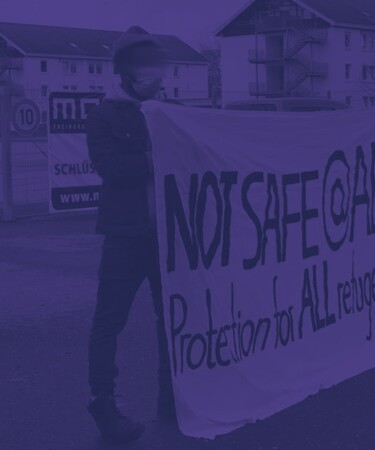
House rules in refugee accommodation violate fundamental rights
There are few places in Germany where fundamental rights count for so little as in refugee accommodation. Together with four asylum seekers, we are going to court.
On 15 June 2023, the Federal Administrative Court heard our lawsuit against the restrictive house rules in the refugee accommodation in Freiburg, which granted security staff broad rights of entry and control. The court rejected the complaint as inadmissible due to a lack of interest in bringing proceedings.
This effectively renders legal protection against house rules impossible, since a decision on the merits can never be reached during the period in which the plaintiffs live in the accommodation. Moreover, by redistributing the refugees, the federal states can then easily dispose of a lawsuit.
Refugees have a right to privacy
Individuals who apply for asylum in Germany have to live in initial reception centres for many months, sometimes even years. A minimum of privacy is therefore indispensable. In Baden-Württemberg, the state government has adopted uniform house rules for all facilities, which disproportionately interfere with the basic rights of the residents. The residents are not allowed to receive visitors. The security service checks the rooms daily and is allowed to enter them even at night and against the residents' will. They are not allowed to engage in political activity anywhere on the premises. They are not allowed to take even simple household items such as a pack of rice, a prayer mat, a screwdriver or hair clippers into the facility.
With the support of GFF, Aktion Bleiberecht Freiburg, Flüchtlingsrat Baden-Württemberg and Pro Asyl, six residents of the accommodation filed an application for judicial review at the Administrative Court of Baden-Württemberg as well as an action for annulment at the Administrative Court of Freiburg against the regulations of the house rules, which violate fundamental rights.
Success before the Administrative Court of Baden-Württemberg: Rooms in initial reception centres are protected private homes
In February 2022, the Administrative Court ruled that the powers of the security service to control and enter the rooms of refugees at any time, as regulated in the house rules, were invalid. The court clarified that the bedrooms in the accommodations are private homes protected by fundamental rights according to Article 13 (1) of the Basic Law. The ruling is based on the Federal Constitutional Court's broad concept of private homes. Because the inviolability of the home is a fundamental right closely linked to human dignity, the scope of protection is to be interpreted broadly. All rooms in which a person has the right to be left alone are protected. Applying these guidelines, specialised courts have already recognised rooms in student dormitories, in a hospital as well as in shelters for the homeless as private homes. Various administrative courts, including the Hamburg Administrative Court, have also granted the protection of the home to rooms in shared accommodation for refugees. In its ruling of 18 February 2021, the Stuttgart Administrative Court denied the protection of the home to rooms in initial reception centres. The Administrative Court of Baden-Württemberg unambiguously rejects this opinion and thus strengthens the protection of fundamental rights in initial reception centres.
Lack of a legal basis
The Administrative Court based its decision on the fact that there is no sufficiently specific legal basis for far-reaching encroachments on fundamental rights such as the room checks provided for in the house rules. The rule of law and the principle of democracy oblige the legislature to make the decisions essential for the exercise of fundamental rights itself. The Federal Constitutional Court has reaffirmed this principle in numerous decisions, notably regarding the school system and the penal system. Encroachments on fundamental rights in accommodation for refugees must also be based on a sufficiently specific legal foundation. The legal authorisation to issue house rules in section 6 (3) sentence 2 FlüAG does not meet these requirements. According to this provision, the Regierungspräsidium Freiburg shall "issue the rules of use and decide on orders and measures necessary to maintain security and order". This vague and general clause-like authorisation does not entitle the respondent to interfere with the inviolability of the home.
The decision of the Administrative Court of Baden-Württemberg is not yet final. Due to the fundamental importance of the case, the Administrative Court has allowed an appeal to the Federal Administrative Court in Leipzig.
Action against further regulations pending at the Administrative Court of Freiburg
Already at the beginning of the proceedings, the Administrative Court classified some of the regulations in the house rules as general decrees that can only be challenged by way of an action for annulment. This concerns the blanket ban on visitors, the ban on any political activity on the premises, the ban on taking photographs inside the premises and the long list of prohibited objects. Two residents and a potential visitor filed a complaint against these bans with the Freiburg Administrative Court on 31 July 2021.
The bans encroach on numerous fundamental rights of the residents, in particular freedom of opinion and religion, protection of the family and the general right of personality. These encroachments on fundamental rights are neither necessary for the protection of other residents nor for safety reasons. Instead of blanket bans that are not linked to a concrete danger, milder regulations are available. The general ban on visitors, for example, could be replaced by set visiting hours and maximum numbers of visitors. In collective accommodation pursuant to section 53 of the Asylum Act, where numerous people from different countries of origin also live together in shared rooms, times are usually set during which visits are generally permitted. The blanket ban on political activity could easily be replaced by a milder regulation that is linked to a concrete risk situation. The list of prohibited objects is far too broad and vague and unreasonably restricts the residents' way of life.
The initial reception centre Freiburg is not an isolated case
Freiburg is only one example for countless facilities in Germany. The same house rules apply in all initial reception centres in Baden-Württemberg; the house rules in many other federal states are similarly disproportionate.
The GFF wants to win fundamental rulings for the protection of basic rights in refugee accommodation. There must be no areas in Germany in which fundamental rights do not apply.



